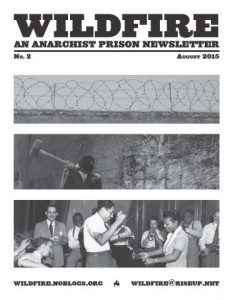It was great to get Issue #2 of Wildfire, and I was even happier to read Michael Kimble’s letter which was, in part, a response to something I wrote in Issue #1. How cool that we have this forum to get this dialogue started– on whether or not hungerstrikes and work stoppages are reformist.
I wrote previously that hungerstrikes and work stoppages are categorically reformist, that by employing them, we seek concessions from those in state power but we do not attempt to eliminate state power entirely.
In his response, related to hungerstrikes, Michael Kimble points out that, at the time Issue #2 went to press, he and I were both on hungerstrikes– which is true. But, as always, our recourse to going hungry did not topple the hierarch enemy, but only made me a hypocrite.
A hungry one, at that.
So, in that sense, hungerstrikes are vindicated as a means for achieving small victories and concessions, but not as a means for bringing anything down.
In contrast, Michael brings up a scenario of a wide spread work stoppage where, if no one goes back to work, the system does collapse. Michael is right, of course, and what he describes is the anarcho-syndicalist dream, the work stoppage to end all work stoppages. The problem is, this has been a dream for centuries because it never materialized, in the free world or in prison.
For such a strategy to succeed in bringing the whole system down, you would need a prison population composed entirely of anarchists. It wouldn’t be enough for 95% of the prison population to reject whatever sweet deals the prison fascists offer in exchange for going back to work. Just 95% solidarity means 5% returned to work and the work stoppage is over. So, in a prison setting, you would need 100% of the prisoners to reject every single deal (free ice cream, a raise in state pay, conjugal visits…) in order to make the system collapse.
I am always skeptical of any plan that requires 100% success from large groups of humans. So, sure, a work stoppage could be a means for revolution, for toppling the system, but it is more readily geared to attain reformist concessions.
This being the case, I urge Michael and others to think beyond these tactics and to imagine how they can employ direct action, which requires small numbers in anonymous actions that, together, make larger systems unmanageable, particularly when inspiring others to jump onto the bandwagon. Such an approach brings a population to recognize its own power, leading to greater and greater acts of rebellion, maybe even, eventually, to the work stoppage that Michael Kimble envisions.
Let’s not dare to “think outside the box.” Let’s tip it over and burn it.
* * *
